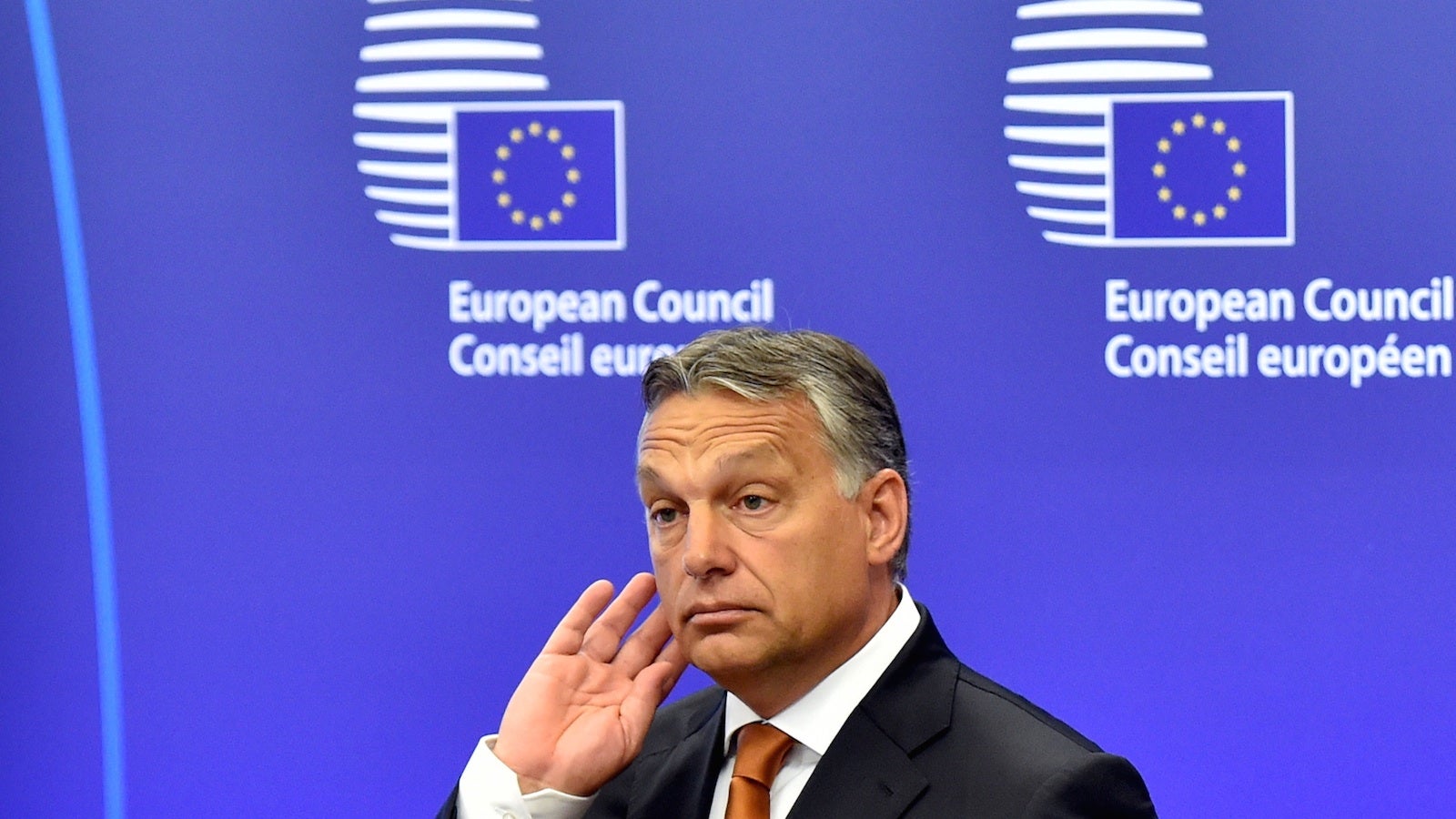Hungary’s leader is determined to keep Europe for Europeans, even as refugees die
On Sep. 2, an intercity train carrying roughly 500 migrants was stopped in the Hungarian town of Bicske, about 30 kilometers (~19 miles) west of Budapest. “All Hungarians were told they could get off, but non-Hungarians remained locked inside the train without drinking water,” The New York Times reports. “Riot police fended off migrants hanging out of windows and chanting that they wanted to go to Austria or Germany.”


On Sep. 2, an intercity train carrying roughly 500 migrants was stopped in the Hungarian town of Bicske, about 30 kilometers (~19 miles) west of Budapest. “All Hungarians were told they could get off, but non-Hungarians remained locked inside the train without drinking water,” The New York Times reports. “Riot police fended off migrants hanging out of windows and chanting that they wanted to go to Austria or Germany.”
Reportedly, a few migrants—many coming from war-torn Syria—managed to slip off the train, prostrating themselves on the tracks before being removed by Hungarian authorities.
Speaking at a conference for European Union leaders in Brussels, Hungarian prime minister Viktor Orbán defended his government’s handling of situations like that which unfolded in Bicske; tactics many in the international community have criticized as heavy-handed and excessively alarmist. (He has authorized the construction of an “anti-migrant” fence along the border with Serbia.)
“Everything which is now taking place before our eyes threatens to have explosive consequences on the whole of Europe,” Orbán wrote in a Sep. 2 op-ed for Germany’s Frankfurter Allgemeine Zeitung (link in German). “Europe’s response is madness. We must acknowledge that the European Union’s misguided immigration policy is responsible for this situation.”
Orbán further objected to plans put forth by the governments of Germany, France, and Italy to redesign Europe’s asylum procedures, and require member states to accept refugee quotas based on national wealth and the capabilities of respective social welfare systems.
“This is not a European problem, it’s a German problem,” Orbán said in Brussels, according to The Guardian. “They all want to go to Germany.”
That is likely the case for most individual migrants. And after such a chilly reception in Hungary, it’s not hard to see why.
The situation in Bickse, and recent events at Budapest’s Keleti train station, highlight Orbán’s newly self-appointment as Europe’s chief anti-immigrant crusader. Though he occasionally refers to the need for protecting Hungary’s quality of life, which refugees ostensibly threaten, his primary motivation is defending Europe’s “Christian identity.”
Putting aside central Christian notions of charity, this is a fairly new concern for modern Hungarians. In the throes of Yugoslav dissolution, roughly 2.3 million people poured into Central and Western Europe from the Balkan Peninsula. Hungary admitted more than 60,000 by June of 1992, according to The New York Times. Many of these refugees were practicing Muslims (they are 40% of the population in Bosnia-Herzegovina, 96% in Kosovo). Did this flood of migrants—many of whom have yet to return to the former Yugoslav republics—significantly alter the demographics of Hungary? Did they undermine, in any way, Hungary’s so-called “Christian identity”?
Hardly. First, we can dispel the notion that the religious makeup of the European continent can be generalized to the point of a single “Christian identity.” There were Muslims on the Iberian Peninsula before there were Christians in the Baltic states. Jewish culture was majorly formative in a number of Central and Eastern European nations. There are even ethnic Magyars, constituting the majority in Hungary, who have practiced Sunni Islam as far back as the 10th century.
What Viktor Orbán fears is not the disintegration of European Christianity (which is being dealt a far more devastating blow by declining church attendance rates than anything else), but rather an influx of non-European peoples residing within Hungarian borders. As is the case with his idealogical contemporaries in France (Marine Le Pen), Britain (Nigel Farage), and the United States (Donald Trump), his xenophobia can be traced to motivations that lie fundamentally in racial paranoia—the idea that Europe should be a place for genetic Europeans to live in prosperous isolation. (Another amusing ahistoricism, as the language and ethnic identity of Hungary is actually derived from Central Asian cultures that moved westward, into the Carpathian Basin, during the 9th century.)
According to the World Bank, Hungary’s per capita gross national income in 2014 was $13,470. In 1993, a year after accepting more than 60,000 Yugoslav refugees, it was $3,690. (Over the two decades bridging the millennium, it grew at a roughly similar rate to other dynamic Central and Eastern European economies, like the Czech Republic and Poland.) So it’s clear an influx of refugees, at least to the order of 60,000, has not observably stunted quality of life in Hungary before; and with only 18,675 displaced persons living in-country, Orbán must realize it can afford to accept more. It would, after all, be the scripturally ordained “Christian” thing to do.
As mentioned, of the 150,000 migrants that have passed (or attempted to pass) through Hungary this year, the majority don’t want to stay. They’d rather find their way to Germany, France, Britain, or the Low Countries. Orbán would prefer they “stay in Turkey.” That sentiment, combined with the actions of his authorities in Bickse and Budapest, indicate that the Hungarian leader’s anti-migrant paranoia extends beyond the borders of Hungary. And he is determined to use his position, at the European Union’s doorstep, to keep Europe European. Even as the death toll mounts higher and higher.